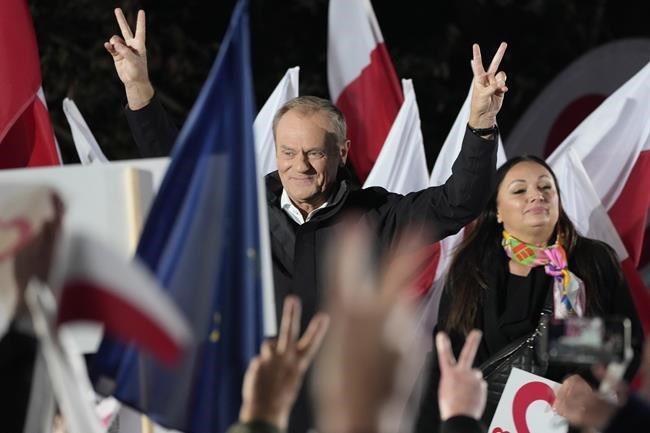
Poland's main opposition leader Donald Tusk speaks to supporters after taking part in an electoral debate in Warsaw, Poland, Monday, Oct. 9, 2023. Leading Polish candidates are holding an energized debate on state TV Monday in which they hope to sway undecided voters, six days before a national election that many Poles believe is the most important one since communism was toppled. (AP Photo/Czarek Sokolowski)
Republished October 09, 2023 - 1:47 PM
Original Publication Date October 09, 2023 - 12:56 AM
WARSAW, Poland (AP) — Poland's opposition leader Donald Tusk on Monday told viewers of state TV that he is a regular person, just like them, as he sparred with Prime Minister Mateusz Morawiecki in an energized debate in which each tried to sway undecided voters, six days before a crucial parliamentary election.
The vote Sunday will decide whether the ruling conservative Law and Justice party will be given an unprecedented third term and continue its Euro-sceptic policies or whether the opposition forces will come to power.
The government's election campaign has been built around discrediting Tusk, a former prime minister and former top European Union figure. His appearance in a debate broadcast live on pro-government TVP gave Tusk a chance to reach out to government supporters.
The debate featuring leaders of six parties and coalitions running in Sunday election was dominated by Tusk and Morawiecki as each tried to cast the other — and his policies — in a bad light.
The debate centered around topics like migration, retirement age and social benefits, unemployment, state assets and security, but candidates were given just one minute to answer, and used some of that time to send their own message.
“I am here for you, you can see that I am just like you,” Tusk told viewers at the start of his time.
Debates in Poland's post-1989 democratic era have in some cases sealed the destiny of candidates, creating a sense of anticipation surrounding the event. Supporters gathered outside the studio to encourage their preferred leaders.
Commentators said afterwards that none of the two main figures emerged as the winner of the debate, as Tusk was visibly tense, which affected his performance, and Morawiecki simply continued his usual attacks on Tusk.
Law and Justice is leading in the polls with around 35% support, yet it is at risk of losing its majority in parliament. Its nearest rival, the Civic Coalition led by Donald Tusk, is just a few points behind but has gained momentum lately.
The Civic Coalition and two other opposition groups together have greater support than the ruling party, but they are weakened by not running together. Small swings in the performance of the smaller parties could shift the final result.
Since the Law and Justice party won power in 2015, it has used TVP as a mouthpiece to praise its own policies and people and vilify the opposition, most notably Tusk.
Notably absent from the debate lineup was ruling party leader Jaroslaw Kaczynski, the country's de-facto leader. He left Morawiecki to represent their party. Before the debate, TVP was broadcasting live Kaczynski's campaign meeting in Przysucha, in central Poland.
Tusk said that Kaczynski had “chickened out,” but minutes later Morawiecki shot back accusing Tusk of being a “coward” for not having visited Ukraine as it is fighting Russia's aggression.
Tusk and his allies accuse Kaczynski of eroding the democratic foundations of the country by taking control of the judiciary branch and public media, and putting the country on a path that could lead out of the European Union.
Law and Justice insists it has no intention of leaving the EU. It is running on promises to continue its social policies and to safeguard the country's security after having built a high wall on the border with Belarus to keep out migrants.
A Tusk-Kaczynski debate in 2007 strongly impacted that year's parliamentary race in which Tusk's party won and then ruled for eight years. Kaczynski, then the incumbent, and his party lost after Tusk came across in the debate as more in touch with the problems of regular people.
Others taking part in the one-hour debate included Szymon Holownia, the head of a centrist-agrarian coalition, whom commentators later praised for having been well prepared and unintimidated; Joanna Scheuring-Wielgus, a left-wing lawmaker representing her Left party and far-right Confederation party co-leader Krzysztof Bosak.
News from © The Associated Press, 2023